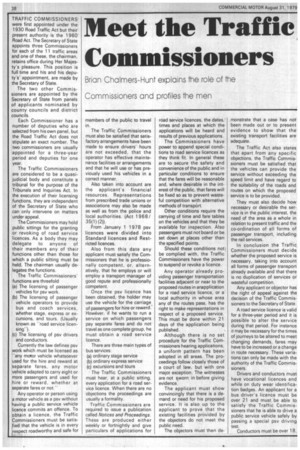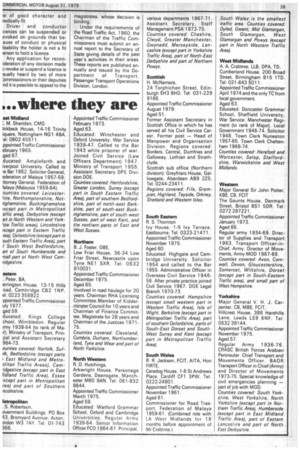Meet the Traffic Commissioners
Page 40

Page 41

If you've noticed an error in this article please click here to report it so we can fix it.
Brian Chalmers-Hunt explains the role of the Commissioners and profiles the men
TRAFFIC COMMISSIONERS' were first appointed under the 1930 Road Traffic Act but their present authority is the 1 960 Road Act. The Secretary of State appoints three Commissioners for each of the 11 traffic areas and one of these, the chairman, retains office during Her Majesty's pleasure. This position is full time and his and his deputy's' appointment, are made by the Secretary of State.
The two other Commissioners are appointed by the Secretary of State from panels of applicants nominated by county councils and district councils.
Each Commissioner has a number of deputies who are selected from his own panel, but the Road Traffic Act does not stipulate an exact number. The two commissioners are usually appointed for a three-year period and deputies for one year.
The Traffic Commissioners are considered to be a quasijudicial body and constitute a tribunal for the purpose of the Tribunals and Inquiries Act. In the execution of their licensing functions, they are independent of the Secretary of State who can only intervene on matters under appeal.
The Commissioners may hold public sittings for the granting or revoking of road service licences. As a body they may delegate to anyone of their members any of their functions other than those for which a public sitting must be held. The chairman usually delegates the functions.
The Traffic Commissioners' functions are threefold (a) The licensing of passenger vehicles for psv work.
(b) The licensing of passenger vehicle operators to provide bus and coach services, whether stage, express or excursions, and tours. (Usually known as "road service licensing-).
(c) The licensing of psv drivers and conductors.
Currently the law defines psv work which must be licensed as "'any motor vehicle whatsoever used for the hire and reward at separate fares, any motor vehicle adapted to carry eight or more passengers and used for hire or reward, whether at separate fares or not."
Any operator or person using a motor vehicle as a psv without having a public service vehicle licence commits an offence. To obtain a licence, the Traffic Commissioners must be satisfied that the vehicle is in every respect roadworthy and safe for members of the public to travel in The Traffic Commissioners must also be satisfied that satisfactory arrangements have been made to ensure drivers' hours are not exceeded, that the operator has effective maintenance facilities or arrangements and that he will use or has previously used his vehicles in a correct manner.
Also taken into account are the applicant's financial resources. Representations from prescribed trade unions or associations may also be made as well as from the police and local authorities. (Act 1968/ 35(1)(2)).
From January 1 1978 psv licences were divided into Standard licences and Restricted licences.
Also from this date any applicant must satisfy the Commissioners that he is professionally competent, or, alternatively, that he employs or will employ a transport manager of good repute and professionally competent.
Once the psv licence has been obtained, the holder may use the vehicle for the carriage. of passengers for hire or reward. However, if he wants to run a service on which passengers pay separate fares and do not travel as one complete group, he must obtain a road service licence.
There are three main types of bus services_ (a) ordinary stage service (b) ordinary express service (c) excursions and tours The Traffic Commissioners must hear, at a public sitting, every application for a road service licence. When there are no objections the proceedings are usually a formality.
Traffic Commissioners are required to issue a publication called Notices and Proceedings. These are produced either weekly or fortnightly and give particulars of applications for road service licences, the dates,' times and places at which the applications will be heard and results of previous applications.
The Commissioners have power to append special conditions to road service licences as they think fit. In general these are to secure the safety and convenience of the public and in particular conditions to ensure that the fares will be reasonable and, where desirable in the interest of the public, that fares will be fixed so as to prevent wasteful competition with alternative methods of transport.
Other conditions require the carrying of time and fare tables on the vehicles and that they be available for inspection. Also passengers must not board or be set down at places other than the specified points.
Should these conditions not be complied with, the Traffic Commissioners have the power to suspend or revoke a licence.
Any operator already providing passenger transportation facilities adjacent or near to the proposed routes in anapplication for a road service licence, or a local authority in whose area any of the routes pass, has the right to make representations in respect of a proposed service. This must be done within 21 days of the application being published.
Although there is no set procedure for the Traffic Commissioners hearing applications, a uniform pattern has been adopted in all areas. The proceedings follow closely those of a court of law, but with one major exception. The witnesses are not sworn in before giving evidence.
The applicant must show convincingly that there is a demand or need for his proposed service. It is also up to the applicant to prove that the existing facilities provided by the objectors do not meet the public need.
The objectors must then de monstrate that a case has not been made out or to present evidence to show that the existing transport facilities are adequate.
The Traffic Act also states that apart from any specific objections, the Traffic Commissioners must be satisfied that the vehicles can provide the service without exceeding the speed limit and have regard to the suitability of the roads and routes on which the proposed service is to be provided.
They must also decide how necessary or desirable the service is in the public interest, the need of the area as a whole in relation to present traffic and the co-ordination of all forms of passenger transport, including the rail services.
In conclusion the Traffic. Commissioners must decide whether the proposed service is necessary, taking into account all forms of passenger transport already available and that there is no duplication of services or wasteful competition.
Any applicant or objector has the right of appeal against the decision of the Traffic Commissioners to the Secretary of State.
A road service licence is valid for a three-year period and it is possible to alter the service during that period. For instance it may be necessary for the times of journeys to be altered to meet changing demands, fares may have to be increased or a change in route necessary. These variations can only be made with the authority of the Traffic Commissioners.
Drivers and conductors must have vocational licences and while on duty wear identification badges. An applicant for a bus driver's licence must be over 21 and must be able to satisfy the Traffic Commissioners that he is able to drive a public service vehicle safely by passing a special psv driving test.
Conductors must be over 18, ie of good character and nedically fit.
Driver and conductor cences can be suspended or evoked on grounds that beause of conduct or physical lisability the holder is not a fit ierson to hold a licence.
Any application for reconideration of any decision made revoke or suspend a licence is isually heard by two of more :ommissioners or their deputies nd it is possible to appeal to the magistrates, whose decision is binding.
Under the requirements of the Road Traffic Act, 1960, the Chairman of the Traffic Commissioners must submit an annual report to the Secretary of State giving details of the past year's activities in their areas. These reports are published annually and issued by the De partment of Transport. Passenger Transport Operations Division, London.




































































































